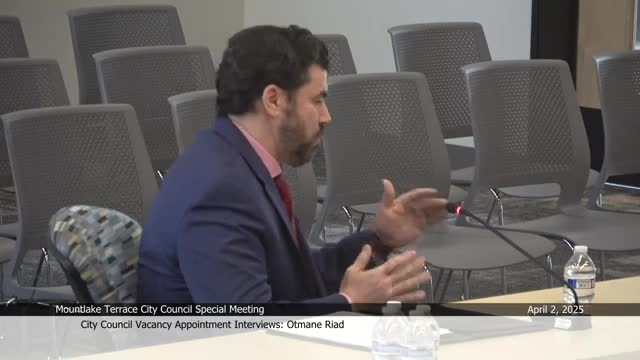Mountlake Terrace council holds marathon interviews to fill vacant seat; applicants emphasize housing, safety and small-business support
Get AI-powered insights, summaries, and transcripts
Subscribe
Summary
The Mountlake Terrace City Council spent a special meeting interviewing more than a dozen applicants to fill a vacant council seat, hearing repeated calls for more housing options, stronger public safety and better support for small businesses.
Mountlake Terrace — The Mountlake Terrace City Council spent a special meeting interviewing applicants for a vacant council seat, hearing from more than a dozen candidates who emphasized housing, public safety, support for small businesses and improved city communications.
Council members opened the session by confirming procedures and telling each applicant they had 20 minutes to answer six prepared questions. “You will have 20 minutes to respond the 6 prepared questions, so please manage your time accordingly,” the mayor told applicants.
The interviews offered a recurring set of priorities. Multiple candidates said the city must expand housing options while protecting existing neighborhoods. “I would strongly advocate for increased housing of all forms,” candidate Chad Watson said, urging a mix of multifamily and single-family solutions and improvements to pedestrian and bike safety. Another applicant said affordable housing, public safety and education were top priorities: “Safety number 1,” one candidate said.
Several applicants pressed the council to make it easier for small businesses to open in new mixed-use buildings around the town center. Robert Castillo said he wanted policies that enable small retailers and restaurants to afford build-outs in ground-floor retail spaces rather than letting those spaces sit vacant. “We have 4 square miles of city to work with. So we gotta do what we can with what we have,” he said.
Council members used the interviews not only to assess applicants’ priorities but to underscore the council’s near-term workload. Multiple council members pointed to the budget as an urgent issue: the city has contracted outside help to review long-term fiscal stability, they said, and the council must plan for the next biannual budget cycle. Council members also noted several implementation tasks coming out of recent planning work, including implementing the comprehensive plan and adopting code updates such as the middle‑housing and critical‑areas updates.
Candidates described different approaches to tight budgets. Some recommended cross‑training staff and pursuing volunteer partnerships and public‑private initiatives to preserve services; others suggested shared sacrifice by higher‑paid positions if cuts are necessary.
Diversity, equity and inclusion (DEI) drew sustained attention. Several applicants said local government should “lead by example” and partner with community groups, while others said the city should support DEI through policy oversight and outreach. Council members described ongoing efforts — the city’s DEI committee, more open houses and expanded social‑media outreach — to reach residents who historically have been less engaged.
Environmental resiliency and quality of life were raised repeatedly as part of a single planning challenge. Candidates and council members framed the answer around the city’s recently adopted comprehensive plan and subarea strategies, arguing for concentrated growth near transit while preserving green space and neighborhood character.
The interviews also surfaced procedural and engagement notes. Applicants and council members described the city newsletter and open houses as the most effective outreach tools, while council members said they are expanding channels (social media, YouTube, Nextdoor and targeted DEI outreach) to widen reach.
No formal appointment or vote occurred at the interview session. Council members indicated they would continue deliberations after completing the interview schedule.
The council scheduled further steps to fill the vacancy after finishing all interviews.
